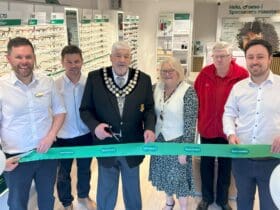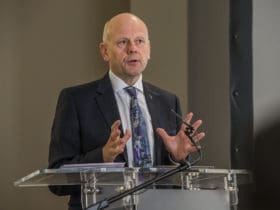A ward sister, who began her palliative care career as a healthcare assistant, has spoken of how her passion for quality end of life care prompted her to become a qualified nurse.
Marla Muir, who has worked for terminal illness charity Marie Curie for 14 years, first started working as a bank healthcare assistant for the charity in Wiltshire. She is now the deputy ward sister on a ward at the charity’s Cardiff and the Vale Hospice in Penarth.
The hospice provides round-the-clock care and support for people living with a terminal illness, and their families.
“I’ve always been passionate about end of life care, it’s always been really important to me,” said Marla, who worked as a healthcare assistant at the hospice for five years before starting her nursing training.
“I wanted to do more for my patients,” said Marla, speaking as she marked International Nurses Day with her colleagues on May 12.
“Doing personal care wasn’t enough for me, I wanted to be able to affect how their symptoms were managed. I wanted to be able to do more to make them comfortable and to have more input.”
So Marla signed up to take her Access to Nursing course, followed by her degree and qualified in 2013. She began her career as a registered nurse on a Cardiac unit to gain experience in medicine, before another opportunity arose in the hospice.
She said her first 9 months following qualification has held her in good stead since Marie Curie began providing support to people living with any terminal illness – including heart failure.
“We’ve opened the doors to all end of life illnesses, which is massive and so important,” she said.
“Because everybody deserves a good delivery of quality care at end of life, it shouldn’t be specific to one particular disease.”
Marla added that an important part of the role was to make positive lasting memories for family members, during such a difficult time.
“It’s such a difficult and emotional journey for patients and loved ones to go through. An experience like this is likely to have affected most people at some point in their life. It’s our role to support and share the burden with all those involved.
She said being able to give that time to families was hugely important to her, and added that for patients, they don’t need to be reminded every day that time is short.
“They like to laugh and have every day normal activities,” she said.
“We’re helping them to live the life they have left.”
Speaking about her journey from healthcare assistant to deputy ward sister, Marla added: “Being able to make that difference was massive, and it feels as if I’ve completed my circle of where I wanted to be. It’s such a rewarding and privileged role.
“Families are always thanking us, but I say it’s a privilege for us. It’s such a difficult and personal time in people’s lives, and to be allowed in is a real big privilege.”
And what does she think helped her take those development steps to her current role?
“I’m empathetic, I think that’s it’s important to be able to stand in somebody’s shoes,” she said.








Leave a Reply
View Comments